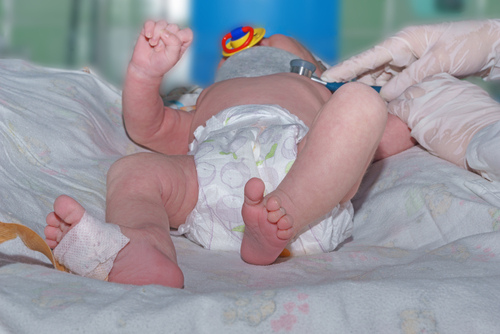Florida has the Florida Birth-Related Neurological Injury Compensation Plan, which can provide compensation to claimants for birth-related neurological injuries to the brain or spinal cord of babies. The injury must be from a mechanical injury or oxygen deprivation that occurred during the labor, delivery, or resuscitation in the immediate postdelivery period and must leave the infant substantially and permanently impaired physically and mentally.
Only live births are eligible for the compensation plan under Florida birth injury law. The infant must have weighed at least 2,500 grams (5.5 pounds) for a single gestation, or 2,000 grams (4.4 pounds) in the event of a multiple gestation. Harm from genetic or congenital abnormalities does not fall within the plan.
The birth injury plan is the exclusive remedy in these situations. The infant’s parents and other interested parties may not bring a medical malpractice action against the doctor or others who delivered the baby. There is an exception to this rule when there is clear and convincing evidence of:
- Malicious purpose
- Bad faith
- Willful and wanton disregard for human safety, rights, or property
A person must elect only one of the remedies. You cannot collect benefits under the plan and sue the health care provider.
Purpose of the Birth Injury Plan
The birth injury plan provides a no-fault system for providing compensation for severely injured babies. All that the infant’s personal representative has to prove is that the infant received qualifying injuries during or shortly after labor and delivery by a participating doctor or at a participating hospital.
The plan removes the need for establishing fault or blame. The personal representative does not have to hire an expert witness to identify what went wrong and who made a mistake. Getting compensation can be less expensive and take less time for the plaintiff.
Family Caregivers
The plan can compensate family members who provide care that is beyond the scope of ordinary child care duties; in other words, care that trained professional attendants typically provide. The plan will only compensate these family members for providing medically-necessary residential or custodial care performed at the direction and control of a physician.
If the family caregiver was not employed at the time, the attendant care compensation will be the federal minimum wage. If the caregiver leaves his or her job to care for the child, the pay will be the amount that Medicaid pays private duty services by a home health aide. The family cannot get more than a total of 10 hours a day in compensated care.
Filing a Claim for Compensation from the Plan
The first step of going after compensation from the plan is to file a petition that states this information:
- Name and address of the legal representative and why that person represents the infant.
- Name and address of the infant that sustained the birth injury.
- Name and address of the hospital where the birth took place.
- Name and address of all doctors who were present at the birth and provided obstetrical services.
- A brief statement of the facts about what happened, including the time and place where the injury happened and a description of the child’s disability.
The claimant then has ten days to file:
- All relevant medical records, assessments, evaluations, prognoses, and other records and documents the administrative law judge will need to determine how much compensation to award on behalf of the injured child.
- Proof of all expenses and services, including documentation of all payments made for those items.
- Information about any source of services or reimbursement available regarding the impairments, whether from a private or governmental source.
The claim then goes through administrative review by government agencies. The administrative law judge assigned to the claim will review the documents and the results of the administrative agency evaluations.
Determinations of the Administrative Law Judge
After the hearing, the administrative law judge has to make a decision about these issues:
- Whether the injury to the infant falls within the plan.
- Whether the obstetrical services performed meet the qualifications of the plan.
- How much compensation, if any, the plan provides in this individual claim.
Awards Under the Plan
An administrative law judge can make an award of compensation that includes the actual costs of medically necessary and reasonable:
- Medical expenses
- Hospital bills
- Habilitative costs
- Training
- Family residential or custodial care
- Professional residential care
- Custodial care and service
- Medically necessary drugs, special equipment, facilities, and related travel.
Deadline to File a Claim Under the Plan
The plaintiff only has five years from the date of the child’s birth to file a claim for compensation under the plan. If the administrative law judge does not award compensation for the birth injury, the infant’s personal representative can file a lawsuit against the health care provider in the civil courts.
The usual statute of limitations that controls the amount of time a person has to file a lawsuit will get extended by the amount of time that the plan claim was pending. In other words, if a year passed from the time the personal representative filed the petition for compensation from the plan and the judgment of the administrative law judge, Florida law will add a year to the standard statute of limitations for filing the civil lawsuit with the courts.
The Requirement of Notice of Participation in the Plan
Except in an emergency, all obstetrical patients must receive notice that the doctor or hospital participates in the Florida Birth-Related Neurological Injury Compensation Plan. The notice must be in writing and in clear and concise language. The form must explain the patient’s rights and limitations.
Getting Legal Help for a Birth Injury
It can be devastating for parents to see that their newborn has suffered a severe injury. The hopes and dreams the parents had for the child might not be a possibility. You want to provide the medical treatment and care your child needs.
At the Montero Law Center, we want to help people who suffer harm from others. We will be happy to talk with you and answer your questions about how Florida birth injury laws affects your claim. Our birth injury attorneys can help you navigate the complex administration and legal process and provide guidance at every step of the way.
Call us today at 954-767-6500 for your free consultation. There is no obligation.
 English
English  Español
Español 

